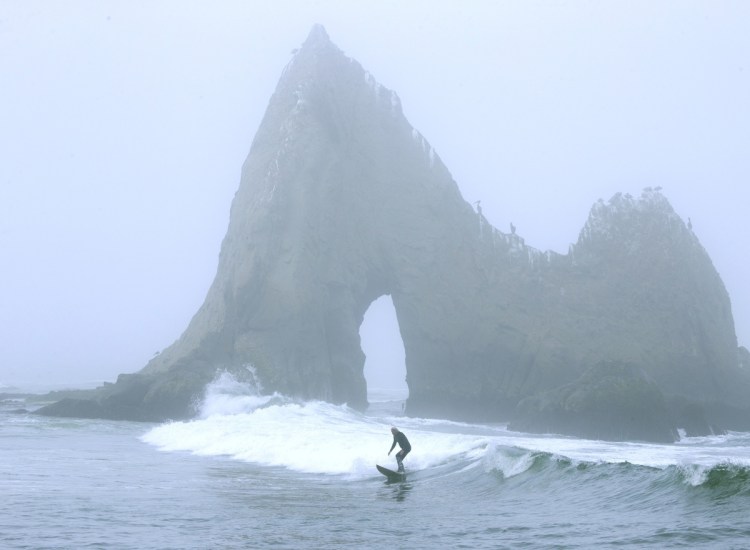LOS ANGELES — The California Coastal Act for decades has scaled back mega-hotels, protected wetlands and, above all, declared that access to the beach was a fundamental right guaranteed to everyone.
But that very principle could be dismantled in the latest chapter of an all-out legal battle that began as a local dispute over a locked gate.
On one side, property owner and Silicon Valley billionaire Vinod Khosla wants Martins Beach, a secluded crescent-shaped stretch of sand and bluffs, to himself. On the other, generations of beachgoers demand continued access to a path long used by the public. The squabble has spurred a spate of lawsuits that now focus on whether Khosla needs state permission to gate off the road – and a string of California courts has said he does.
Unwilling to back down, Khosla is now appealing to the U.S. Supreme Court over his right to shut out the public. His latest argument not only challenges the constitutionality of the Coastal Act – if taken up by the nation’s highest court, it also would put into question long-established land use procedures and any state’s power to regulate development anywhere.
“It’s bold, it’s arrogant, it wants to strike at the core of our society,” said Joe Cotchett, lead attorney for the Surfrider Foundation, which sued Khosla in its fight for public coastal access. “This is so much bigger than a little beach in San Mateo County. It’s a steppingstone to every coastline in the United States.”
Khosla, not short on money nor shy in his tactics, has tapped a new lawyer uniquely suited to overcome the longshot odds of bringing this argument before the nation’s nine top justices. Now leading his legal team is Paul Clement, who served as U.S. solicitor general under President George W. Bush, has clerked for the late Justice Antonin Scalia and “argued more Supreme Court cases since 2000 than any lawyer in or out of government,” according to his professional bio at Kirkland & Ellis LLP.
He has defended a number of conservative positions, such as arguing against same-sex marriage and leading the legal challenge against President Obama’s Affordable Care Act. In his 151-page petition to the Supreme Court, Clement described California’s coastal policies as “Orwellian” and made the case that private property should not be taken for public use without just compensation.
The Supreme Court will probably decide in the next three months whether to take up the case. Chances are infamously slim: Of the thousands of appeals filed each year, only about 100 are granted review. But with conservative interpretations of property rights gaining prominence and President Trump’s recent appointment of Justice Neil M. Gorsuch, having the right lawyer and a well-crafted argument might just be enough to win the four Supreme Court votes needed.
Khosla’s arguments, while ambitious, are “artfully drafted in an effort to capture the attention of at least four justices,” said Richard Frank, director of the California Environmental Law and Policy Center at the University of California, Davis. “This petition is targeted directly at the conservative wing of the United States Supreme Court, and it certainly is plausible that the court could grant review in this case given the quality of representation and the issues involved.”
The issues date back to 2008, when Khosla, a co-founder of Sun Microsystems, bought the 89-acre property south of Half Moon Bay for $32.5 million.
The Deeney family that sold Martins Beach had, for almost a century, maintained a public bathroom, parking lot, even a general store. Surfers, fishermen and picnickers paid 25 cents to enter. The fee eventually went up to $10.
Khosla, in legal filings, said he “was willing to give the business a go, and continued to allow members of the public to access the property upon payment of a fee. But (he) soon faced the same problem the Deeneys had faced: The business was operating at a considerable loss, as the costs of keeping the beach, the parking lot and other facilities in operable and safe condition significantly exceeded the fees the business generated.”
So he shut the gate, hired security and posted “do not enter” signs.
A number of public interest groups have since sued Khosla. He, in turn, has sued the California Coastal Commission, the State Lands Commission and San Mateo County, over what he considered an interference of his property rights.
Copy the Story LinkSend questions/comments to the editors.



Success. Please wait for the page to reload. If the page does not reload within 5 seconds, please refresh the page.
Enter your email and password to access comments.
Hi, to comment on stories you must . This profile is in addition to your subscription and website login.
Already have a commenting profile? .
Invalid username/password.
Please check your email to confirm and complete your registration.
Only subscribers are eligible to post comments. Please subscribe or login first for digital access. Here’s why.
Use the form below to reset your password. When you've submitted your account email, we will send an email with a reset code.